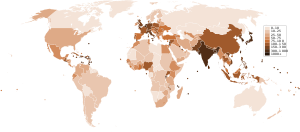 Image via Wikipedia
Image via WikipediaDoes anyone else feel, as I do, that the rising human population is probably the greatest threat to our security on the planet? Currently, according to the World Population Clock as I write, there are 6,855,542,801 (click the link and frighten yourself to death as you watch it increase before your eyes). The same counter estimates a world population of 8,730,121,285 by November 2050.
These numbers are too large to properly comprehend, of course. But the overall upward trend terrifies me. We have already reached a stage where millions are starving, millions if not billions have no access to safe water supplies, energy reserves are too scarce to go round, and many mineral resources are rapidly declining.
As the underdeveloped nations climb the ladder toward a Western level of consumerism, the calls on almost every resource will become unsustainable. If we can’t avoid starvation in the world now, how are we going to do so with a 20% increase in mouths to feed? Many experts predict that the next wars will be over drinking water; that seems to me like stating the bleeding obvious.
The increased consumption of materials and fuel and the resultant output of pollutants and carbon dioxide will inevitably accelerate the rate of climate change, which in turn, will add damaging stress to the ecosystems producing crops.
It is likely that war is inevitable under such circumstances. As a species, and as separate social groups, we have always shown a remarkably blinkered attitude to inevitable changes. Many of the civilisations that preceded ours vanished or declined rapidly as a result of ecological disasters. Are we to go the same way?
We do have a choice. We can do something to prevent catastrophe. It won’t affect me, other than at the very end of my likely lifespan. But it will affect my child and any individual currently under the age of about 40.
A fundamental change has to be the way we view our reproduction as a species. We have long had the means to limit our growth, to reduce the many children born to some couples. Of course, there are authorities in the world who see such intervention as sinful and against the will of their God. Perhaps these authorities should look at the poverty, misery and distress that their insistence on such dogma cause. The perceived need to continually increase the membership of any club (for which, read religious grouping) is hardly a reason to threaten the stability of life on Earth, is it?
They will no doubt use the defence that we must not behave as if we were God. But we do that daily by our intervention in the health and welfare of the population at large. If we can intervene to save life, why can’t we intervene to prevent its development?
I’ve had my say – or some of it – and now invite you to say your piece. Please, let me and the world know what you think about this.

4 comments:
Hi Stuart,
I agree that the growing population definitely has a negative affect on the ecosystem, especially in many of the under-developed countries. And I agree that if left unattended, it will have a negative affect on the future of humanity.
I think that educating the people in these countries will cover every aspect of their life including their own views on having too many children. As the old saying goes, "Give a man a fish and he'll live for a day, teach him to fish and he'll live for a lifetime."
And I believe this is true in this instance, as well. We need to be even more diligent than we already are in getting into these communities and teaching the people how to grow crops, how to build homes, how to support themselves, how to administer proper health care to their families and how to become a supportive community of people. There are innumerable cases where UNICEF has gone into these areas and taught the people and literally brought them into the 21st century.
With education and financial support, these people will come to the same mindset as many of us are already, and that is that if the human race is going to continue, we need to become more responsible in our actions. And I think that it is the responsibility of the civilized countries to step in and educate the people in the under-developed countries.
After all, if we're not part of the answer then we're part of the problem.....
Thank you, Ronnie; a viewpoint I can easily agree with.
Yes, teaching far outweighs just going in and providing. But it takes a long time - a generation? Will it be too late by then? And there are countries where teaching people will not work because they're already mind-battered by their fanatic religions (and I'm not talking about Christian religions)and religious leaders.
How right you are, Sue. I suspect the learning process will take too long to make real change in time, but I think we should still try it. My suspicion is that nature will sort the problem out for us, if we don't act pro-actively, though.
I'm not sure I'd exclude any of the religions from the mind-battering - they all seem to have their extremists.
Post a Comment